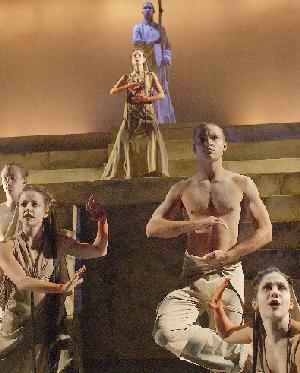SEARCH CurtainUp
REVIEWS
FEATURES
NEWS (Etcetera)
ADDRESS BOOKS
Broadway
Off-Broadway
BOOKS and CDs
OTHER PLACES
Berkshires
London
Los Angeles
Philadelphia
Elsewhere
QUOTES
On TKTS
LETTERS TO EDITOR
FILM
LINKS
MISCELLANEOUS
Free Updates
Masthead
NYC Weather
 Berkshire Review
Berkshire ReviewSiddharta, A Jungian Fantasy
| The world, Govinda, is not imperfect Or confined somewhere along a gradual pathway In order to love the world I must stop trying to compare it To some imagined world that I wished for, Some perfection I had thought up, And let it be as it is And love it. ---the older Hermann reflecting on his lifelong search for truth and meaning. |

(l-r) John Lysaght, Isadora Wolfe, Jill Michael, Joe Jung, Brad Kilgore and Erin Gorski
(Photo: Kevin Sprague)
|
As you take your seat at the Unicorn Theatre, the chalkboard mounted on an easel seems at odds with the somber gray steps that dominate the stage. That chalkboard announces that this is "The Magic Theater" but haven't we come to see Eric Hill's adaptation of Hermann Hesse's 1921 novella, Siddhartha?
Siddhartha is indeed the play at hand, but note the subtitle, a Jungian fantasy. It's your clue that playwright-director Hill has transformed Hesse's spare tale into a complicated dual story of the troubled hero and his troubled creator.
The title character of Siddartha is a young Brahmin who persuades his father to let him journey into the world to explore the meaning of life. He experiments with asceticism and a life of the senses and wealth before a ferryman helps him to become attuned to true knowledge and inner peace by accepting that life, like the river, flows continuously so that past, present and future are all one.
The use of the title "The Magic Theater" to establish the link between the author and his fictional creation is actually from Hesse's most famous novel, Steppenwolf. The tag line after that title -- "Not for Everybody" -- turns out to be an apt caveat with which to begin this review.
Hill's expertise in the Japanese Suzuki method of acting and movement would seem a perfect fit with Hesse's Indian youth's journey towards inner peace and acceptance of life as it is rather than as one would have it. Indeed it often is quite beautifully and compellingly so; but if much of this author-framed adaptation has you confused as it segues between the real Hesse's ruminations and the fictional Siddartha's self-seeking journey (especially during the first act), you won't be alone. This is definitely not for everybody, and especially not for theater goers looking for light summer entertainment.
The framing device which has a wheelchair bound old Hermann Hesse (Andrew Michael Neiman) introduces us to the events in his life and the thought processes that prompted him to write Siddhartha do add some needed touches of humor. However, the introduction of the Doctors Jung (Jereme Anglin) and Freud (Chris Bolden) as well as other real life characters somehow fails to clearly fulfill Hill's intention of depicting Hesse's artistic journey and Siddhartha quest for truth as mirror images of each other; neither does the addition of peripheral text by Hesse, though this does enable Hill to leave the audience with many questions to contemplate.
The script is written as free form poetry. Its measured poetic beat does go with the stylized staging, but rather than magical, the effect tends to be sluggish and repetitive -- so much so during the initial hour that my attention often strayed to the figure of Vasuveda (Joe Jung) at the top of the steps to see if he could indeed retain that difficult frozen pose. (He does!) Actually, it is in the second act, when Vasuveda finally descends from his silent pose at the top of the steps and ferries Siddhartha across the river, with the ensemble circling their "boat" to evoke a rippling river, that the play takes on the qualities of a magic show.
The production overall is beautiful to look at and greatly enhanced by Carleton Coffrin's lighting design and Marija Djordjevic's costumes. The young actors do fine work, most in several roles. All but two have been students of Hill's at the University of Connecticut's theater department which he's leaving to chair the theater department at Brandeis University. (The two exceptions are Kate McGuire's daughter Isadora Wolf, and Hill and McGuire's son Alexander who plays Siddartha's son). The problem is that much of this production feels like an ambitious master's thesis in drama that's not quite ready for prime time.
If you go, get there a little early to read the helpful program. It includes the director's enlightening notes headlined "a jungian slip" and an informative biography of Hesse clarifying his continued relevance. One of the quotes included could be a just written comment on the recent survey of the depressing decline in reading works of literature: "Without words, without writing and without books, there could be no concept of humanity."
|
SIDDHARTHA, A Jungian Fantasy Written by Hermann Hesse Adapted and Directed by Eric Hill Cast: Jereme Anglin (Dr. Carl Jung, Gotama Buddha, a crusader), Chris Bolden (Siddhartha's father & Dr. Freud), Erin Gorski (Shakti), Alexander Hill (Siddhartha's son), Joe Jung (Vasuveda), Brad Kilgore (Siddhartha, Ka) , John Lysaght (Govinda), Michael McComiskey (Young Hermann Hesse), Jill Michael (Sarasvati, Nurse), Andrew Michael Neiman (Hermann Hesse), Brian Sell (Kamaswami), Isadora Wolfe (Lakshmi, Kamala). Scenic Design: Yoshi Tanokura Costume Design: Marija Djordjevic Lighting Design: Carleton Coffin Sound Design: Nathan Leigh Running Time: 2 hours, includes one 10-minute intermission Berkshire Theatre Festival's Unicorn Theatre, Route 7, Stockbridge, 413-298-5576 July 7, 2004 to July 31, 2004 Monday through Saturday at 8 PM. All tickets are general admission --$27 www.berkshiretheatre.org Review by Elyse Sommer based on August 8th performance |



Great Places to Eat, Shop, Stay
Berkshire Inns
Sheffield Pottery
In Lee:
Pamela Loring Gifts
Morgan House Inn & Restaurant
In Lenox:
Andrew De Vries Sculptures
In Williamstown
Pappa Charlie's Deli
Thai Garden
Listing information: esommer@curtainup.com
m

6,500 Comparative Phrases including 800 Shakespearean Metaphors by CurtainUp's editor.
Click image to buy.
Go here for details and larger image.


